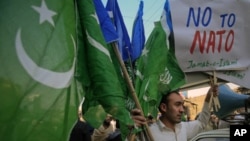Pakistan is vowing increased defiance in its relationship with NATO and the United States, following Saturday's deadly coalition attack on Pakistani forces.
Pakistan's army chief, General Ashfaq Kayani, has ordered his country's forces along the Afghan border to defend against any future aggression without having to wait for instructions from high command.
Pakistani military sources confirmed to VOA Friday that General Kayani told his soldiers to fully retaliate "irrespective of the cost and consequences" to any future aggression, following the NATO bombing on two Pakistani border outposts nearly a week ago that killed 24 Pakistani soldiers.
The military also on Friday categorically denied a report in the Wall Street Journal citing unnamed U.S. officials who say Pakistan had given NATO permission to carry out attack. The report alleges Pakistan assured NATO commanders there were no Pakistani forces in the area, after U.S. special forces took fire from the Pakistani side of the border.
An investigation is underway to determine exactly what happened in the pre-dawn hours of November 26, when Pakistan says NATO helicopters and fighter jets fired on the outposts in the Mohmand tribal region for more than an hour. A U.S. military investigation report is due out later this month.
Prime Minister Yousuf Raza Gilani and other top officials briefed Pakistan's Parliamentary Committee on National Security Friday.
Information Minister Firdous Ashiq Awan says the committee endorsed the prime minister's decision to boycott next week's Afghanistan reconciliation conference in Bonn, Germany.
"Pakistan is not going to participate in that Bonn conference," said Awan. "None of our representatives will go there."
The 17-member legislative committee formally backed the prime minister's assertions that Pakistan's sacrifices in the war on terror have not been adequately acknowledged, and that the NATO attack was a violation of Pakistan's sovereignty. Awan says the committee will form recommendations for changes in Pakistan's relationship with the West.
"They will give some road map and guidelines to the parliament to decide about the new terms of cooperation with our NATO allies regarding this war on terror," he said.
Pakistan has already closed the two main overland supply lines that NATO relies on for much of its food, fuel, and other logistical items. Islamabad also has ordered Washington to vacate its forces from a southwestern Pakistan airbase.
Foreign Minister Hina Rabbani Khar says more changes may come soon.
"Fundamental change will be required in the terms of engagement," she said. "We want to be partners of the world in this entire effort - but not at the cost of Pakistan. Pakistan wants stability in the region, but Pakistan's primary focus has to be on the stability and sovereignty of Pakistan."
Prime Minister Gilani told lawmakers Friday that under no circumstances would his government allow Pakistan's sovereignty and territorial integrity to be jeopardized by, what he called, "ill-considered and rash actions."
He used the statement to reiterate Pakistan's frustration over continued calls from the West to do more in the fight against terrorism, saying there is a limit to Pakistan's patience and that "cooperation cannot be a one-way street."
Pakistan Takes Defiant Tone with NATO
- By Kurt Achin




